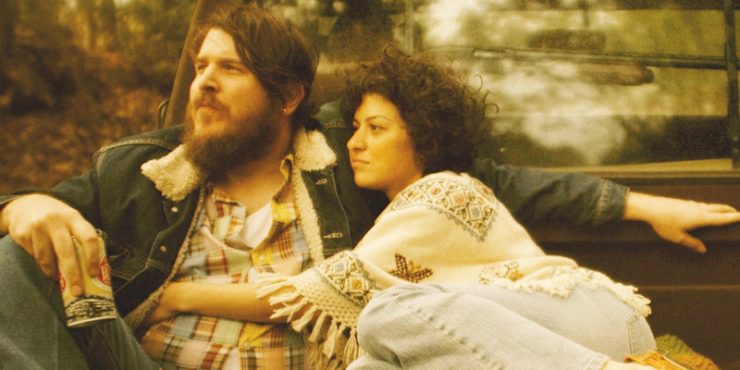Ethan Hawke’s perseverance in Hollywood is in debt to his talent but also to his passion. The actor has maintained a career over multiple decades, taking on a variety of roles, always imbuing his characters with an idiosyncrasy that belies his movie star good looks and his natural ability to perform in really any kind of movie. He’s not above starring in The Purge or against Demi Lovato in Getaway, but the fuel is always saved for meatier prospects, like Training Day or his collaborations with Richard Linklater. This spills over a bit into Blaze, a film he directed, about the notorious Texas singer-songwriter Blaze Foley. A mythological figure in country music circles, Hawke wishes to bring the myth to life, as both a true human being and a symbol of dashed dreams. This is a film about both the man and the legend.
Blaze Foley is played by Ben Dickey, a musician with no previous acting experience, who allows Hawke to record live performances of Blaze’s famous songs, such as “Clay Pigeons” and “If I Could Only Fly”. Dickey’s Blaze is a rambling, mercurial figure who spends more time on stage monologuing about his thought processes than performing songs, getting grouchy with less-than-respectful audience members before proceeding to play his set. When we meet him, his reputation as a virulent drunk has squandered his chance at any true success as a recording artist, and his fellow musicians have to resort to begging with bar owners for stage time. He’s helped slightly by his friendship with Townes Van Zandt (Charlie Sexton), a successful country singer with his own demons that might bring Blaze down with him.
Blaze peeks back at Foley’s more peaceful times, particularly his relationship with Sybil Rosen (Alia Shawkat), a Jewish actress who meets Blaze at a bohemian acting retreat and then proceeds to spend a year living with him in a treehouse. Their escape from civilization is the catalyst Blaze needs to begin writing songs, with Sybil as his muse. The two get married, and Sybil is willing to work to support Blaze’s dreams of becoming a country music legend. Their love is soon overtaken by the temptations of drugs and women that Blaze meets on the road, and instead of becoming the legend he wanted to be, he falls into a spiral of drugs and resentment. Hawke’s script (co-written by Rosen herself, and based on her book Living in the Woods in a Tree: Remembering Blaze) posits that his relationship with Rosen is central to his life as a person, but also as a musician, and failing to rediscover that light after their demise is what eventually leads to his downfall.
Hawke cuts the film with a lot of fluidity (the film is edited by Jason Gourson), with most scenes beings intercut with others, often intertwining the relationship between music and time in a lyrical way that illustrates how little there is that stands between the man and his music. For Hawke, Blaze’s music is the man at his most pure, and its up to the songs to tell us about him, more so than his actions or his sins or his love. Dickey, buying fully into Blaze’s emotional instability, expertly toggles between honest portrayal and larger-than-life blustering. Neither he nor Hawke is interested in making a bare bones biopic, but crafting a film about the awesome power of good music and the toll it can take on the one who creates it. As Sybil, Alia Shawkat proves yet again her deft touch for empathy and humanity, giving Blaze its most grounded perspective and its most generous performance.
Watching Blaze, one could be reminded of the films of Jonathan Demme, in their love for live music, their attention to the lives of background characters, but most importantly their overflowing love for their principal figures. Hawke’s appreciation for Blaze Foley as an artist is obvious in every frame and every sweeping sequence, often supported by one of his songs. There are times when Blaze is as meandering as Blaze himself, who’s filibustering on the stage could quickly turn the audience against him, but the film is filled with such an obvious affection, it becomes easy to forgive. With cinematographer Steve Cosens, Hawke creates an ethereal, often beautiful portrait of Americana, a Southern tale of an artist’s attempt to sacrifice love and happiness for his shot at immortality. The tragedy is that Blaze Foley died at 39 before finding success in his life, but the beauty is that the illusive immortality eventually did find him after his death.
Directed by Ethan Hawke










